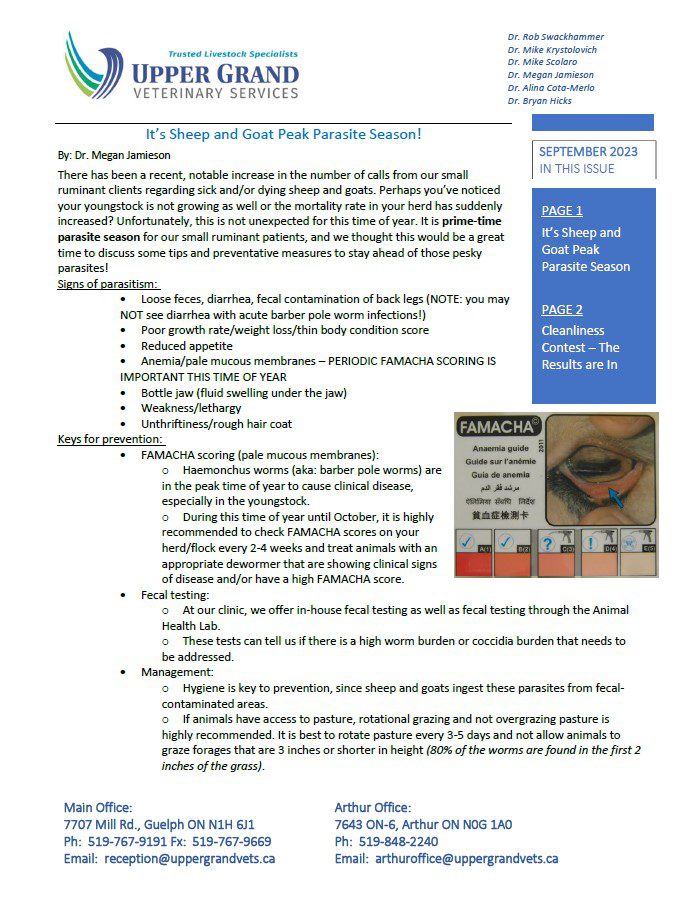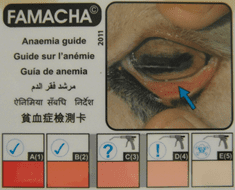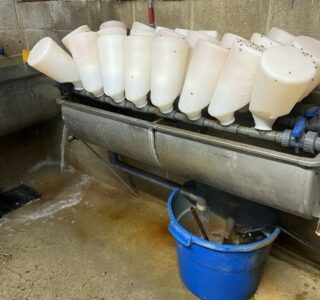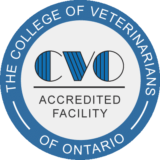UGVS Newsletter – September 2023

It’s Sheep and Goat Peak Parasite Season!
By: Dr. Megan Jamieson
There has been a recent, notable increase in the number of calls from our small ruminant clients regarding sick and/or dying sheep and goats. Perhaps you’ve noticed your youngstock is not growing as well or the mortality rate in your herd has suddenly increased? Unfortunately, this is not unexpected for this time of year. It is prime-time parasite season for our small ruminant patients, and we thought this would be a great time to discuss some tips and preventative measures to stay ahead of those pesky parasites!
Signs of parasitism:
- Loose feces, diarrhea, fecal contamination of back legs (NOTE: you may NOT see diarrhea with acute barber pole worm infections!)
- Poor growth rate/weight loss/thin body condition score
- Reduced appetite
- Anemia/pale mucous membranes – PERIODIC FAMACHA SCORING IS IMPORTANT THIS TIME OF YEAR
- Bottle jaw (fluid swelling under the jaw)
- Weakness/lethargy
- Unthriftiness/rough hair coat

Keys for prevention:
- FAMACHA scoring (pale mucous membranes):
- Haemonchus worms (aka: barber pole worms) are in the peak time of year to cause clinical disease, especially in the youngstock.
- During this time of year until October, it is highly recommended to check FAMACHA scores on your herd/flock every 2-4 weeks and treat animals with an appropriate dewormer that are showing clinical signs of disease and/or have a high FAMACHA score.
- Fecal testing:
- At our clinic, we offer in-house fecal testing as well as fecal testing through the Animal Health Lab.
- These tests can tell us if there is a high worm burden or coccidia burden that needs to be addressed.
- Management:
- Hygiene is key to prevention, since sheep and goats ingest these parasites from fecal-contaminated areas.
- If animals have access to pasture, rotational grazing and not overgrazing pasture is highly recommended. It is best to rotate pasture every 3-5 days and not allow animals to graze forages that are 3 inches or shorter in height (80% of the worms are found in the first 2 inches of the grass).
Cleanliness Contest – The Results are In!
By: Dr. Mike Scolaro
With over 10 herds participating in our calf feeding hygiene program, we had the opportunity to drill down on cleanliness and what separated the good from the great. Here are our top findings!
- Herds that used a cool or tepid rinse step before washing with hot water had significantly cleaner bottles than those that rinsed with hot. Why is that? When we rinse with hot water, milk proteins can ‘cook’ onto the interior of the bottle and create a perfect environment for bacteria to feed and grow.
- A mechanical cleaning step (brushing) makes a big difference in bottle cleanliness, especially in the barrel of bottle nipples.
- In automated feeding systems, we were very often surprised at the increased bacterial presence in components like the lines and mixing vessel. This suggests that manually cleaning and sanitizing these is key, even though they may have automatic cleaning cycles!
- Old plastic can get micro-cracks and help bacteria hide and avoid cleaning processes and chemicals. All plastic has a lifetime and respecting that can maintain acceptable hygiene levels.
We saw all kinds of strategies and methods of cleaning, from simple basin wash programs to restaurant style dishwashers and even homemade bottle washers. The bottom line is all these systems can provide adequate levels of hygiene with the right management!
 Our contest winners are the team at Spruit Holsteins in Alliston! Peter and Kathleen have created a homemade bottle washer. First, bottles are rinsed inside and out with warm water. Then, they are washed with hot water and bleach, followed by a hot water rinse. This system allows for the inside of bottles to be thoroughly sprayed and have good contact time with the cleaning agents before being dried. Calves are fed from these bottles before they are put in a group pen and fed by an automated feeding system. Peter is emphatic that good hygiene is important, and more achievable than we sometimes think. “You don’t need to spend thousands of dollars on a purpose-built bottle washing system,” he says.
Our contest winners are the team at Spruit Holsteins in Alliston! Peter and Kathleen have created a homemade bottle washer. First, bottles are rinsed inside and out with warm water. Then, they are washed with hot water and bleach, followed by a hot water rinse. This system allows for the inside of bottles to be thoroughly sprayed and have good contact time with the cleaning agents before being dried. Calves are fed from these bottles before they are put in a group pen and fed by an automated feeding system. Peter is emphatic that good hygiene is important, and more achievable than we sometimes think. “You don’t need to spend thousands of dollars on a purpose-built bottle washing system,” he says.
We asked Peter and Kathleen what guiding principles helped them decide to develop such a focused effort on calf hygiene. “We literally could not afford to do a bad job” Peter remarks, laughing. Knowing the future of the herd lies in healthy and fast-growing calves, they understand the important role hygiene plays in the productive life of these calves.
“If you have any questions on these or other topics, please do not hesitate to contact one of our Veterinarians.”





